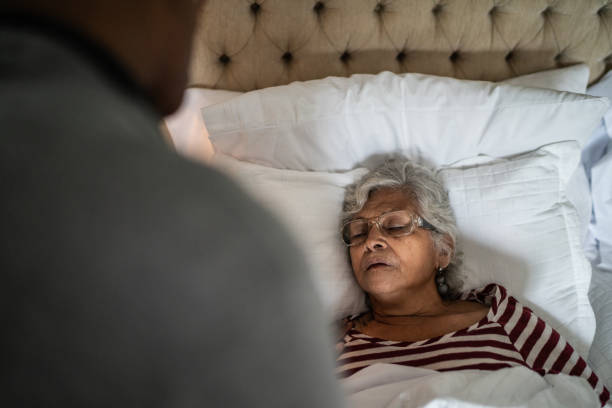Introduction

Millions of people worldwide are affected by Parkinson's disease, which is a neurodegenerative disorder that can greatly impact daily life and decrease quality of life. One of the many areas affected by Parkinson's is nutrition and sleep, making it imperative for those living with this condition to understand how to manage their diet and sleeping habits.
In this blog post, we'll explore the relationship between nutrition and sleep in Parkinson's disease, shedding light on the importance of understanding this link and providing tips for better care.
Diet quality, sleep, and quality of life in Parkinson's disease
Individuals with Parkinson's disease must recognize the connection between nutrition, sleep, and overall well-being. For individuals with Parkinson's disease, having a balanced diet, getting enough sleep, and maintaining a healthy lifestyle can greatly improve their quality of life. Nutrition is especially important to maintain good health for those with Parkinson's disease, as it is for anyone else.
First, it is important to understand diet's role in managing symptoms of Parkinson's disease. Eating a balanced diet containing lean proteins, fruits and vegetables, whole grains, and heart-healthy fats can help to nourish the body and keep dopamine levels up. Vitamins such as vitamin B12 may also help protect neuronal cells from damage caused by oxidative stress and inflammation. Additionally, certain compounds found in foods such as tomatoes, peppers, berries, and tea have been linked with reducing inflammation associated with Parkinson's disease.
Second, getting enough sleep is essential for people with Parkinson's disease. Sleep plays a role in the body's ability to repair itself, and lack of sleep can lead to a decline in cognitive functioning. Managing Parkinson's disease symptoms requires getting 7-8 hours of restful sleep every night, which is crucial.
Individuals with Parkinson's disease can greatly improve their quality of life by adopting a healthy and active lifestyle. Regular exercise, including walking, swimming, or biking, can help strengthen muscles and increase flexibility, thus reducing stiffness typically associated with Parkinson's disease. Participating in enjoyable activities like art classes or social events can assist in reducing stress and keeping individuals connected with family and friends.
By understanding the importance of diet quality, sleep, and physical activity concerning Parkinson's disease, people living with the condition can be empowered to make positive lifestyle changes to improve their overall quality of life. Eating a balanced diet, getting enough sleep, and staying active are all essential components for managing symptoms associated with Parkinson's disease. With the right knowledge and support, those with Parkinson's can improve their health and well-being.
Dietary Factors that influence sleep
Tryptophan
An essential amino acid called tryptophan can be found in dairy products, eggs, and legumes.
It has a significant role in regulating sleep as it is a precursor to melatonin, a hormone that controls our sleep-wake cycles. Studies have shown that intake of tryptophan-rich foods may improve sleep quality. In Parkinson's disease, however, tryptophan levels can be lower than normal due to poor diet or medication side effects. Therefore, understanding the relationship between nutrition and sleep in Parkinson's disease is crucial for managing symptoms and improving overall health and well-being.
Dietary sources of tryptophan include milk, eggs, and meat such as chicken, turkey, tuna, and salmon. Plant-based sources include soy products, nuts, and seeds like pumpkin, chia, and flaxseed. Tryptophan can also be found in fortified foods like cereals and oatmeal. Eating these foods regularly may help boost tryptophan levels, allowing better control of sleeping patterns and improved overall sleep quality in Parkinson's disease.
Caffeine
Caffeine is a stimulant in many popular beverages, such as coffee and tea. Although caffeine can provide an energy boost to help us get through the day, consuming too much of it can harm our ability to sleep. In people with Parkinson's disease, caffeine consumption should be moderated. Too much caffeine can disrupt sleep patterns, leading to fatigue during the day.
Alcohol
Alcohol is a known sedative, and while it may initially help with sleep onset, the quality of sleep suffers. Studies have found that those who drink alcohol before bed require more time to enter deep sleep and wake up more frequently throughout the night. For people with Parkinson's disease, this can be particularly problematic as getting a restful sleep is key for managing symptoms during the day.
In addition to disrupting sleeping patterns, alcohol can worsen PD-related movement problems such as slowness in movement (bradykinesia) and muscle stiffness (rigidity). Furthermore, some medications used to treat Parkinson's should not be taken with alcohol due to potential side effects. It is, therefore, important for individuals with Parkinson's disease to be mindful of how much alcohol they consume.
Fluid intake
Fluid intake is important when understanding the relationship between nutrition and sleep in Parkinson's disease. Proper hydration requires you to ensure adequate intake of fluids, which in turn can reduce fatigue and enhance focus and mental clarity. It is also essential for regulating body temperature during sleep, allowing for a better quality of restful sleep.
While water is optimal for staying hydrated, other drinks can still offer sufficient fluid intake. Low-fat milk, 100% juice, herbal tea, and decaffeinated coffee are good options. To prevent disturbances in your sleep, it is advised to steer clear of beverages high in sugar. Consuming foods that can lead to quick changes in blood sugar levels might disrupt your sleep by triggering sudden drops in blood sugar and causing you to wake up at night.
How does sleep influence nutrition?
Appetite control
In Parkinson's disease, changes in sleep patterns may lead to changes in appetite and dietary intake. Research has shown that reduced night-time sleep is associated with a lower intake of essential nutrients such as vitamins and minerals and an increased risk of developing malnutrition. A lack of proper nutrients can directly impact the advancement of Parkinson's disease, resulting in decreased cognitive and physical abilities. Additionally, research has suggested that changes in sleep patterns may also affect appetite control. Studies have found that individuals with sleep disturbances are likelier to experience increased hunger and cravings for unhealthy foods.
Sleep-related disorders

In addition to poor nutrition, inadequate or disrupted sleep in Parkinson's disease can also lead to the development of other sleep-related disorders. These include increased daytime fatigue, restless legs syndrome, and excessive daytime sleepiness. Symptoms like these can significantly impact your daily routine, including tasks such as working, driving, and socializing.
Management strategies
Individuals with Parkinson's disease must understand the relationship between nutrition and sleep to manage their condition effectively. Dietary modifications, such as consuming more foods rich in vitamins and minerals while reducing the intake of junk food, may be recommended by nutritionists. Additionally, managing stress levels and establishing good sleep hygiene practices can be key to avoiding or alleviating the symptoms of Parkinson's disease. Sleep specialists may also prescribe medications such as melatonin to help regulate the body's sleep-wake cycle and improve the overall quality of sleep.
How dopamine deficiency affects sleep patterns
Dopamine is a key neurotransmitter, and its deficiency can affect sleep patterns in Parkinson's disease. Dopamine helps to regulate wakefulness, arousal, and motivation. People with Parkinson's disease may have difficulty staying awake during the day and falling asleep at night because their brain circuits that regulate sleep and wakefulness are less active, which is caused by insufficient dopamine.
Dopamine also plays a role in circadian rhythms, which are the body's internal clock and are important in regulating our sleep patterns. In Parkinson's disease, dopamine deficiency can disrupt our natural sleep-wake cycle and lead to difficulty staying awake during the day and difficulty falling asleep at night.
What are some common nutritional deficiencies in Parkinson's disease, and how do they affect sleep?

Common nutritional deficiencies in Parkinson's Disease include B vitamins, magnesium, zinc, and vitamin D. Deficiencies of these nutrients can lead to disturbed sleep patterns and disrupted circadian rhythms.
B Vitamins are essential for nerve health, energy production in the body, hormone balance, and metabolism. Low levels of B vitamins can make it difficult to get restful sleep and cause fatigue. Magnesium is important for nerve health, muscle relaxation, and neurotransmitter function. Low magnesium levels can increase anxiety and difficulty sleeping or staying asleep.inc helps regulate melatonin production and maintains healthy neurological communication in the brain.
Low zinc levels can hinder melatonin production and cause muscle tension, resulting in difficulty sleeping well. Finally, Vitamin D is important for hormonal balance, bone health, immune system function, and disturbances in the circadian rhythm. Inadequate vitamin D levels may cause a reduction in melatonin production and result in disrupted sleep patterns.
Identifying and correcting any nutritional deficiencies can help improve sleep patterns and overall wellness in Parkinson's Disease.
Additionally, lifestyle changes such as practicing yoga or reducing stress can help support better sleep. Lastly, speaking with a doctor about medications or treatments may help improve sleep quality. Knowing the triggers and identifying nutritional deficiencies can help improve overall health, well-being, and sleep patterns for those with Parkinson's Disease.
FAQ's
What helps Parkinson's patients sleep?
Some helpful strategies for improving sleep in Parkinson's patients include managing stress levels, establishing good sleep hygiene practices, taking supplements to address nutritional deficiencies, and speaking with a doctor about medications or treatments.
Is sleep more important than nutrition?
Sleep and nutrition both play important roles in overall health. Maintaining good sleep and a balanced diet are equally crucial for physical and mental well-being. Therefore, ensuring nutritional adequacy and good quality sleep is essential for optimal health.
What is the most important vitamin for sleep?
Vitamin D is crucial for a good night's sleep because it helps regulate melatonin production and keeps the brain's neurological communication healthy. Poor sleep quality may result from low vitamin D levels, reducing melatonin production. To improve sleep, consider supplementing with vitamin D after consulting your physician.
What nutrients are good for quality sleep?
Nutrients that are beneficial for quality sleep include B vitamins, magnesium, zinc, and vitamin D. B Vitamins help to maintain hormone balance and energy production in the body, while magnesium helps with nerve health and muscle relaxation. Zinc helps regulate melatonin production, and Vitamin D is important for hormonal balance and immune system function.
Do people with Parkinson's need a lot of sleep?
People with Parkinson's Disease may need more sleep than the average person due to the disease's effects on energy levels, hormone balance, and metabolism. On average, people with Parkinson's should aim for 7-8 hours of sleep a night to maintain optimal health. It is best to discuss individual sleep needs with a doctor.
Conclusion
I hope this article helped clarify the connection between nutrition and sleep in Parkinson's Disease. Identifying any nutritional deficiencies, maintaining good sleep hygiene practices, and speaking with a doctor about medications or treatments may all help support better sleep quality for those with Parkinson's Disease. Knowing the triggers and addressing dietary needs can help improve overall health and well-being. Wishing you good luck in your endeavors to enhance your well-being and attain restful sleep!

